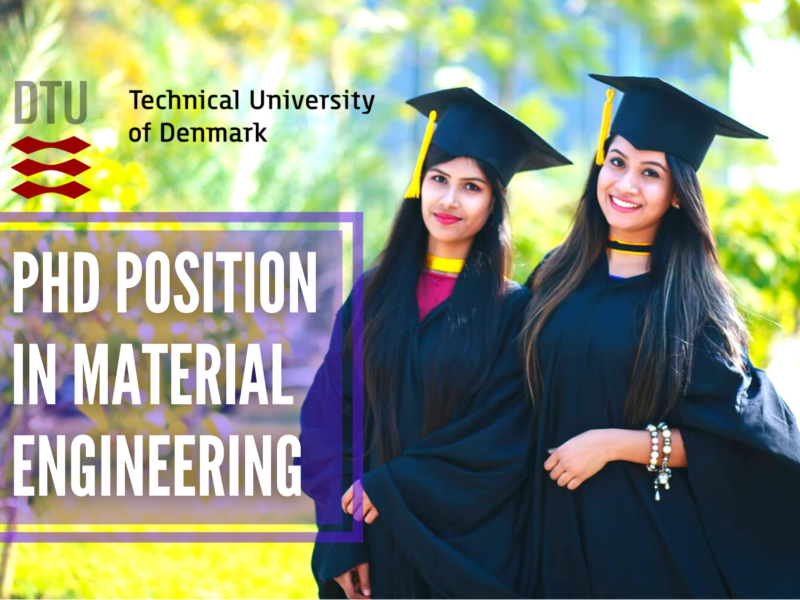Are you an engineer motivated by challenging tasks in micro-and nanofabrication? Are you keen on advancing research in miniaturised integrated devices for energy storage? The Technical University of Denmark is looking for a skilled PhD candidate to develop on-chip micro-supercapacitors as part of the project ‘Pyrolytic Hierarchical Organic Electrodes for sustaiNable Electrochemical Energy Systems (PHOENEEX)’, which is funded by a European Research Council (ERC) Consolidator Grant.
Table of Contents
Summary
| Scholarship Sponsor | Technical University of Denmark |
| Scholarships level | PhD scholarship |
| Award Amount | Salary |
| Fellowship Period | Three years |
| Study area | Nanoengineering, Physics, Mechanical Engineering, Material Engineering |
| Opening date | February 22, 2021 |
| Closing date | March 19, 2021 |
Project Description
The overall vision of PHOENEEX is to develop sustainable electrochemical energy systems. In this context, you will work in close collaboration with several researchers in an interdisciplinary team.
You will be affiliated with DTU Nanolab, where we conduct cross-disciplinary research and apply micro-and nanotechnology to a wide range of scientific disciplines and applications. The Biomaterial Microsystems group is a highly ambitious group pursuing research on microfabrication of 3D polymer and carbon structures and devices and their application in drug delivery, bioelectrochemistry and sustainable energy.
Application Deadline
The deadline for applications is March 19, 2021
Approval and Enrolment
The PhD degree scholarship is subject to academic approval, and the candidate will be enrolled in one of the general degree programmes at DTU. For information about our enrolment requirements and the available planning of the PhD study programme, please see the DTU PhD Guide.
Assessment
The applicants’ assessment will be made by Prof. Stephan Sylvest Keller, Prof. Henri Jansen and postdoctoral researcher Babak Rezaei (DTU Nanolab).
About DTU
DTU is a leading technical university globally recognised for the excellence of its research, education, innovation and scientific advice. We offer a rewarding and challenging job in an international environment. We strive for academic excellence in an environment characterised by collegial respect and academic freedom tempered by responsibility.
Salary and appointment terms
The appointment will be based on the collective agreement with the Danish Confederation of Professional Associations. The allowance will be agreed upon with the relevant union. The period of employment is three years.
Further information
Further information may be obtained from Prof. Stephan Sylvest Keller, suke@dtu.dk. You can read more about DTU Nanolab and the Biomaterial Microsystems group at www.nanolab.dtu.dk.
Eligibility
Miniaturised electrochemical capacitors, conventionally defined as micro-supercapacitors (μSCs), gain increasing attention as possible means for energy storage in implants, sensor platforms or personal electronics requiring power the order of μW. However, the power and energy density in μSCs is still relatively low, and the performance rapidly decreases during continuous operation.
The overall aim of this PhD project is to fabricate on-chip µSCs providing high energy density and long operational stability. For this purpose, you will investigate novel approaches for the fabrication of highly interdigitated 3D carbon microelectrodes with tailored material properties, large surface area and hierarchical architecture using pyrolysis. In this process, polymer precursor micro-and nanostructures are exposed to high temperatures (> 900°C) in an inert atmosphere (N2 or Ar) and converted into pyrolytic carbon. Your primary tasks will be to:
- Plan and execute experimental research in the DTU Nanolab cleanroom facilities
- Develop and optimise novel processes for the fabrication of 3D carbon electrodes
- Fabricate on-chip µSCs with high electrode surface area
- Perform characterisation of the electrode materials
- Analyse the electrochemical performance of the µSCs
- Collaborate with an interdisciplinary research team in a focused scientific effort
- Contribute as a teaching assistant at DTU Nanolab and supervise BSc and MSc student projects
Qualifications
- You must have a two-year master’s degree (120 ECTS points) in micro- or nanoengineering, physics, mechanical engineering, material engineering or a similar degree with an academic level equivalent to a two-year master’s degree.
- You must have hands-on experience in micro-and nanofabrication. Preferably, you have worked with electrochemistry and methods for material characterisation.
- You can interact with researchers in a very interdisciplinary environment.
- A high-grade average and excellent English language skills are decisive to be considered for the scholarship.
Application Process
Your complete online application must be submitted no later than March 19 2021 (Danish time). Applications must be submitted as one PDF file containing all materials to be given consideration. To apply, please open the link “Apply online”, fill out the online application form, and attach all your materials in English in one PDF file. The file must include:
- A letter motivating the application (cover letter)
- Curriculum vitae
- Grade transcripts and BSc/MSc diploma
- Excel sheet with translation of grades to the Danish grading system (see guidelines and Excel spreadsheet here)
You may apply prior to obtaining your master’s degree but cannot begin before having received it.
All interested candidates irrespective of age, gender, race, disability, religion or ethnic background are encouraged to apply.









 ARC Future Laureate Fellowship at James Cook University, Australia
ARC Future Laureate Fellowship at James Cook University, Australia